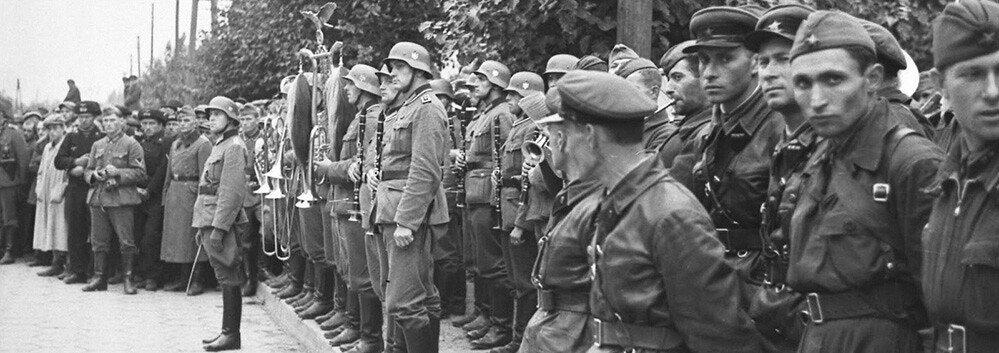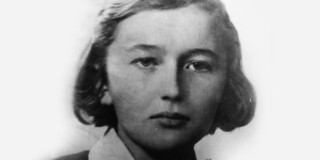The Nazi-Soviet joint parade of 1939 in Poland that some deny, in video
On this day, September 1, 1939, World War II began with the German invasion of Poland, under the Ribbentrop-Mólotov Pact between Germany and the USSR.
The USSR denied until 1989 the secret protocol signed with Germany
That pact included a secret protocol that was discovered and published by the British after the end of the war. The USSR denied for more than 40 years the existence of this secret protocol, until it finally recognized it in 1989. In it, Hitler and Stalin distributed Poland, Lithuania, Latvia, Estonia and Finland. As regards Poland, the pact stated that "the spheres of influence of Germany and the U.S.S.R. shall be bounded approximately by the line of the rivers Narev, Vistula and San."
Germans and Soviets celebrated their victory over Poland with a parade
The USSR invaded Poland on the east on September 17, 1939. On September 22, Germans and Soviets were in the Polish town Brześć Litewski (today Brest-Litovsk, in Belarus). The commander of the German forces was General Heinz Guderian, then to the control of the XIX Corps of Armies. He had been the one who had conquered Brest after a hard resistance of the Polish garrison that defended the castle of that city. The Soviet column was headed by Russian General Semyon Krivoshein, at the head of his 29th Light Tank Brigade. After the meeting, Krivoshein invited Guderian and the other German commanders to his tent, where they toasted his victory over Poland. Speaking fluently in French, the Soviet general apologized to the German commanders for not having invited any ladies to the event, and invited them to visit Moscow after what he wished for a quick victory over capitalist England (a victory that was not possible, largely thanks to Polish pilots who came to Britain and joined the RAF in defending the island during the Battle of Britain). That same day, Germans and Soviets made a joint parade in Brest to celebrate their victory. You can see some photos here:
Russian nationalists and communist continue to deny the obvious
Today eight years ago I published a post about that parade, showing photos of the same that I could find on my own. Then there was not even an entry on it in Wikipedia (created a few days later). Despite the graphic evidence, then it was not uncommon to find nostalgics of the USSR and Russian nationalists denying those facts. In this regard, I encourage you to take a look at the discussion page of the entry on this parade in the English version of Wikipedia. In it, Russian nationalists and communist users began denying the existence of this parade in September 2009. Faced with graphic evidence, they opted for another strategy: to affirm that the supposed parade had in fact been a withdrawal of the German troops from that city, monitored by Soviet commanders. The fact is that the images clearly show Guderian presiding over the parade, in which Soviet troops and vehicles participated. As that did not strain, they tried to prove another argument: compare that parade together with the surrender ceremonies of Japanese and Germans before the Americans. But it is clear that these are not comparable cases, starting from a most elementary fact: in Brest in 1939, Germans and Soviets were not giving up each other, but were celebrating their victory over the Poles.
At the height of attempts to manipulate what was clearly an invasion of a sovereign nation, a Russian communist complained that the partition of Poland between Hitler and Stalin was described as "occupation", when in Belarus they call it "reunification". The historical fact is that Belarus, as such, was not an independent state until 1990, so to speak of its "reunification" in 1939 is at best absurd.
A video of what a well-known Spanish politician dismissed as 'unlikely'
The most recent of these denial attempts came in September 2013. A Spanish university professor published a book entitled "Machiavelli in front of the big screen. Cinema and politics". In it, the author tackles the film "Katyn" (2007) by Andrzej Wajda: "In the first few seconds of the film, we have the geopolitical starting point: Poland, represented by an unarmed mob trying to escape, is occupied by Germans and Soviets. This parallelism between Nazis and Soviets is constant throughout the film, but there are especially striking moments, as when we see them salute and joke with each other. There is even a sequence, historically unlikely but very effective in a film, in which one of the German officers calls his Soviet interlocutor amicably 'comrade'."
The author of these words is Pablo Iglesias Turrión, former militant of the Young Communists and current leader of Podemos. As it turns out that from that scene that he thinks "unlikely" not only there are photos, but also recorded on film:
I wonder how much longer some will continue to deny those facts that are so well documented today and which demonstrate the complicity of the two great totalitarian powers of the time - Hitler's Germany and Stalin's USSR - in the destruction of free and independent Poland. My homage and my memory to all the Polish patriots who fought and died in those days to stop the invaders.
Cześć i chwała bohaterom!
Honor and glory to the heroes!
|
Don't miss the news and content that interest you. Receive the free daily newsletter in your email: Click here to subscribe |
- Most read
- The real reason for Sánchez's victimizing letter using his wife as an excuse
- The brutal 'touch and go' of a Lufthansa Boeing 747 at Los Angeles Airport
- Portugal confirms that it has begun its transition to the F-35 and indicates bad news for Spain
- The ten oldest national flags in the world that are still in use today
- Lenin: numbers, data and images of the crimes of the first communist dictator
- A Corporal of the Regular Forces of the Spanish Army dies in an exercise in Poland
- The interior of the Statue of Liberty torch and the sabotage that canceled its visits

 ES
ES





Comentarios:
P.A.Spayd
YES, this is correct – it is the surrender of the Poles to the RUSSIANS and the GERMAN Army. General Guderian is clearly there – and I HAVE PHOTOS of this event from the BAK – as I am the biographer of Wehrmacht Major Fritz Bayerlein, who was on the staff of the 10th Panzer Division under General Guderian at this time. It is in my first book on Bayerlein. (XIX Armee Korps –Panzer) These photos are at the Bundesarchiv KOBLENZ in Germany and are all clearly labeled.
18:14 | 8/11/17
Zbigniew Lisiecki
«That secret protocol was discovered by the British after the end of the war» – Well, yes, but they and the Franch new it already before the war ! They’v simply forgotten to pass it to their alia – Poland !
6:30 | 2/09/20
Opina sobre esta entrada: